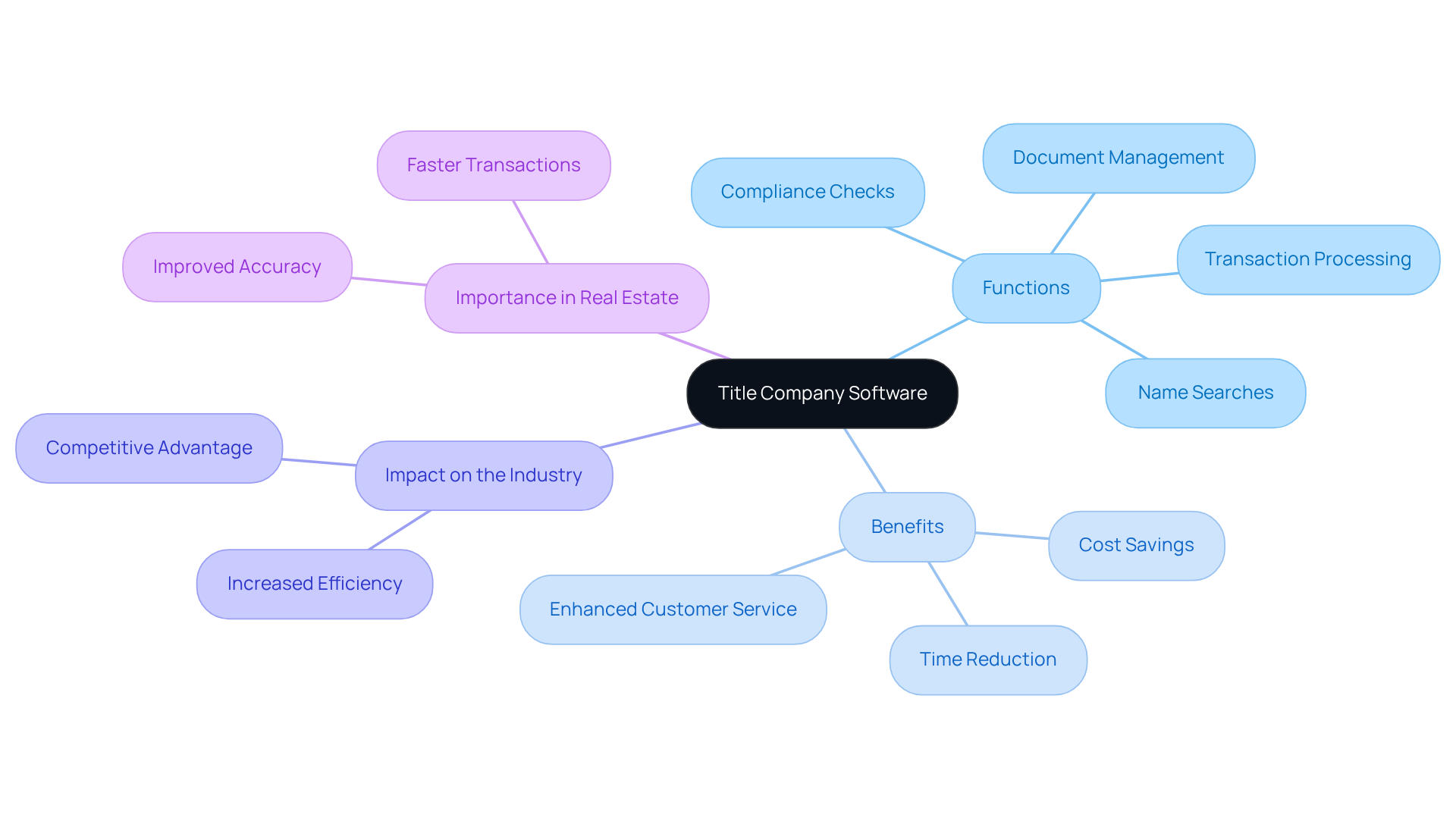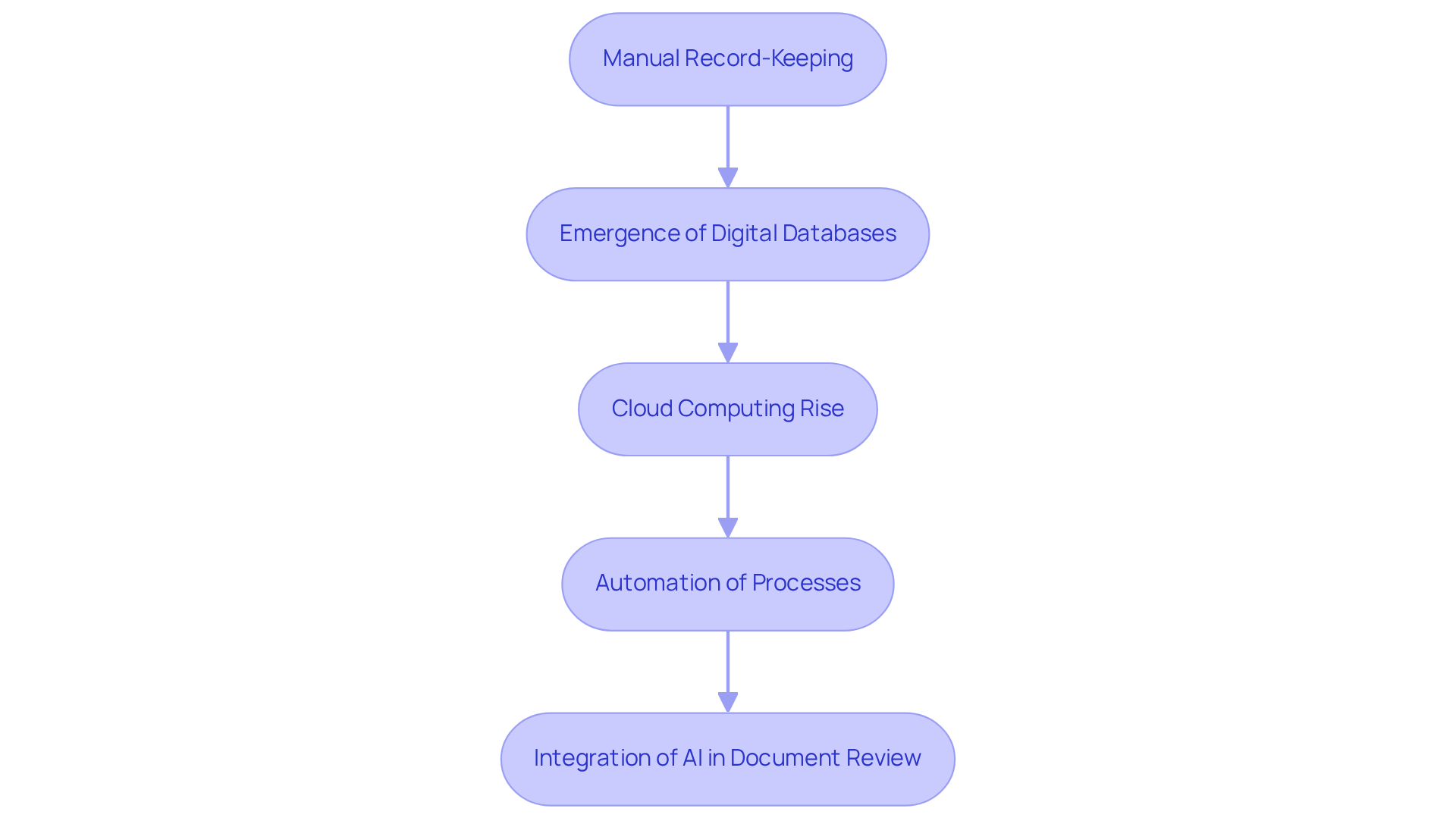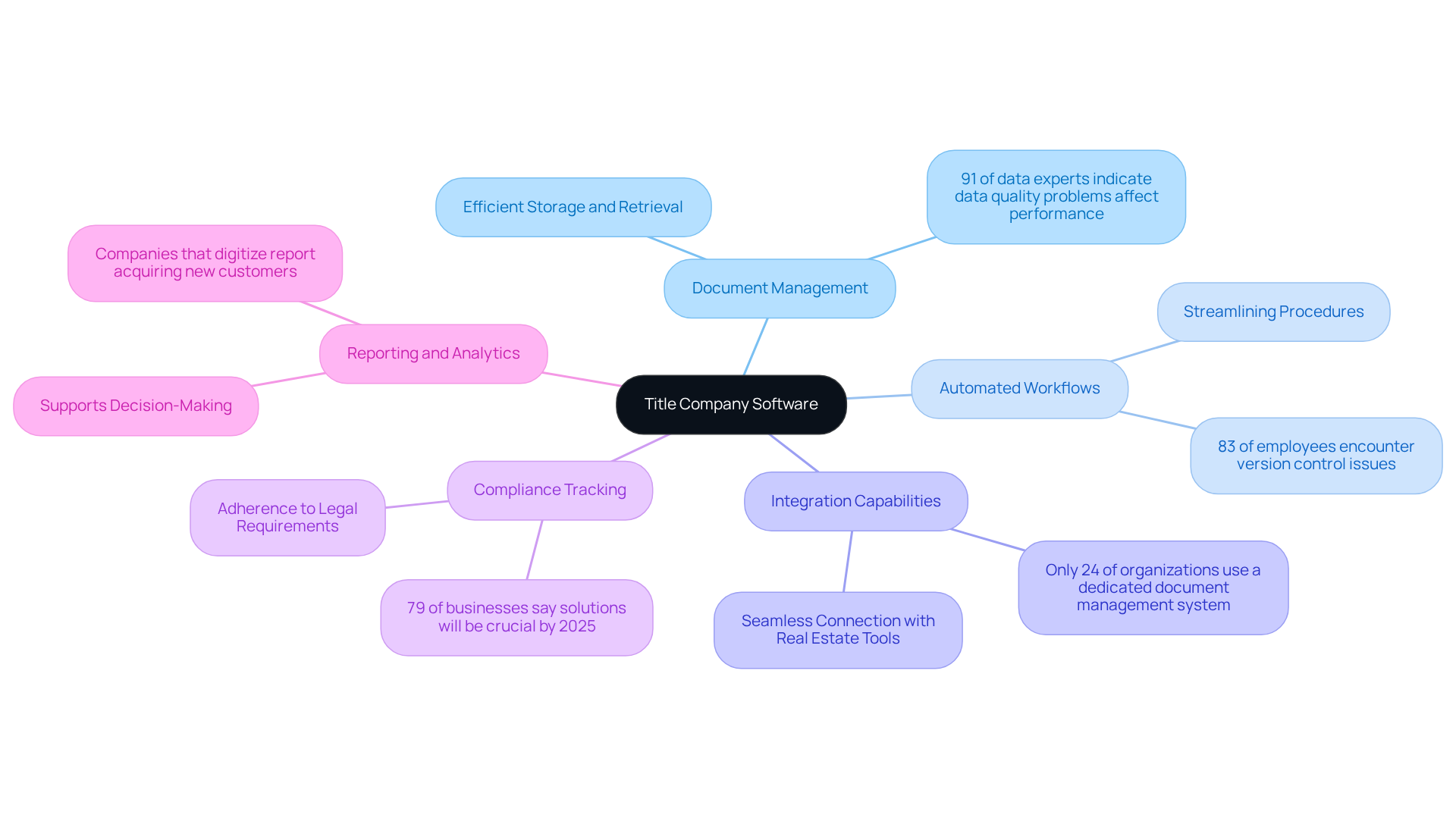Overview
Title company software serves as a specialized instrument tailored to optimize the operations of title firms and real estate professionals. By automating crucial tasks such as document management, compliance checks, and transaction processing, these tools significantly enhance efficiency and accuracy in real estate transactions. This enhancement is vital for maintaining competitiveness in a fast-paced market, where the ability to process transactions rapidly can greatly influence success.
Furthermore, the implementation of such software addresses the common challenges faced by professionals in the industry, providing reliable solutions that not only streamline workflows but also foster trust among clients. Consequently, adopting title company software is not merely an operational upgrade; it is a strategic move towards achieving a more effective and competitive business model.
Introduction
The real estate industry is experiencing a technological revolution, with title company software leading this transformation. These specialized applications not only streamline essential processes such as document management and compliance checks but also significantly enhance the efficiency of title firms in a competitive market.
As the demand for rapid and accurate transactions grows, a critical question emerges: how can real estate professionals effectively leverage these digital tools to navigate the inherent challenges of title research and maintain their competitive edge in a fast-paced environment?
Defining Title Company Software: Purpose and Relevance
These applications encompass specialized tools that enhance the functions of title firms and real estate experts, illustrating what is . They simplify critical tasks such as name searches, document management, compliance checks, and transaction processing. By automating these processes, property company applications exemplify what is title company software, significantly reducing the time and effort required to confirm ownership and manage real estate transactions.
In a fast-paced market where buyers often make decisions about a property within the first eight seconds of viewing it, the efficiency provided by these tools is essential. For instance, Doma's patented machine intelligence technology can decrease processing time from five days to as little as one minute, underscoring the transformative impact of technology on the industry. Furthermore, the average time to close a transaction currently stands at 46 days, further emphasizing the necessity for rapid processing capabilities.
As real estate experts increasingly strive to enhance their workflows, knowing what is title company software becomes not merely advantageous but crucial for maintaining competitiveness and ensuring accuracy in transactions. Industry experts assert that embracing these digital tools is vital for enhancing customer service and closing more deals, reinforcing the idea that success in real estate hinges on effectively leveraging technology.
Moreover, employing real estate management tools can lead to substantial cost reductions compared to traditional methods, while also ensuring compliance and security protocols are met, which are indispensable for property professionals.

Historical Context: The Evolution of Title Company Software
The development of title agency applications has its roots in the early days of the sector, characterized by manual record-keeping and paper-based processes. As the real estate market expanded, the necessity for more efficient methods became increasingly clear. The advent of digital databases in the late 20th century marked a significant turning point, providing expedited access to record information. By the 2000s, the rise of cloud computing and advanced software solutions empowered companies to automate numerous processes, resulting in the development of comprehensive production software, which includes what is title company software, integrating various functionalities into a single platform. This evolution has not only enhanced efficiency but also improved the accuracy and reliability of property ownership research.
For instance, Riverside Title & Escrow's adoption of in their document review process exemplifies how technology can streamline operations and minimize manual errors. However, specialists emphasize that while technology enhances efficiency, the importance of human expertise remains critical in navigating the complexities of ownership research. Striking a balance between technological advancements and skilled human oversight is essential to mitigate risks associated with overreliance on automation. Ultimately, the integration of digital databases and sophisticated technological solutions has transformed the industry, resulting in a more robust and responsive service landscape.

Key Features and Functionalities of Title Company Software
Understanding what is is essential for enhancing operational efficiency and ensuring compliance in a competitive market, particularly for real estate firms. These features include:
- Document Management: This functionality facilitates the efficient storage, retrieval, and management of title documents, guaranteeing easy access and organization. With 91% of data experts indicating that data quality problems negatively impact company performance, robust record management is vital for upholding high standards.
- Automated Workflows: By streamlining procedures such as name searches, paperwork preparation, and compliance checks, automated workflows significantly reduce manual errors and save time. In fact, 83% of employees encounter challenges with version control issues, underscoring the necessity for automation in research.
- Integration Capabilities: The ability to seamlessly connect with other real estate tools and platforms enhances collaboration and data sharing. However, only 24% of organizations employ a dedicated document management system, revealing a gap that firms must address to boost efficiency.
- Compliance Tracking: This feature guarantees adherence to legal and regulatory requirements, minimizing risks associated with title transactions, which is essential in understanding what is title company software. As 79% of businesses assert that solutions will be increasingly crucial by 2025, compliance tracking becomes ever more significant.
- Reporting and Analytics: Generating detailed reports and insights supports decision-making and elevates operational performance. Companies that digitize acquiring new customers due to improved efficiency, highlighting the critical role of analytics in driving business growth.
Collectively, these characteristics empower firms to operate more efficiently, addressing the pressing challenges of document management and workflow automation in the research domain.

Importance of Title Company Software in Overcoming Research Challenges
Agency applications are essential for addressing the myriad challenges encountered by professionals in the field. Issues such as incomplete or inconsistent document records, discrepancies in property ownership, and the complexities of legal language can significantly impede effective research. By leveraging advanced technologies like machine learning and optical character recognition, document management tools can swiftly extract and analyze information from extensive records, drastically reducing the time needed for searches.
Furthermore, automated compliance checks guarantee that all legal requirements are fulfilled, thereby minimizing the risk of errors that could lead to costly disputes. The integration of firm applications into researchers' workflows enhances precision and streamlines the entire research process, enabling professionals to concentrate on more valuable tasks.
Additionally, Parse AI provides flexible subscription options, including monthly and annual plans, as well as a pay-as-you-go model. For customized solutions, our customer success team is readily available to discuss the most suitable subscription option for your needs. This dedication to customer support ensures that what is title company software adapts to the evolving demands of the industry, delivering significant cost savings compared to .
Conclusion
Title company software serves as a pivotal tool in the real estate sector, streamlining processes and enhancing the efficiency of title firms. By automating critical tasks such as document management, compliance tracking, and transaction processing, these applications not only save valuable time but also improve accuracy and reliability in property ownership research.
Key insights throughout the article have highlighted the historical evolution of title company software, showcasing its transition from manual methods to sophisticated digital solutions. The discussion on essential features, including:
- Automated workflows
- Integration capabilities
- Robust reporting tools
underscores the necessity for these technologies in overcoming the challenges faced by real estate professionals. Furthermore, the importance of balancing technological advancements with human expertise is emphasized, ensuring that while efficiency is enhanced, the complexities of ownership research are navigated with care.
As the real estate landscape continues to evolve, the adoption of title company software is not just a competitive advantage; it is a crucial element for success. Embracing these digital tools can lead to significant cost savings and improved customer service, ultimately driving more successful transactions. Real estate professionals are encouraged to leverage these technologies to enhance their operations, stay compliant, and meet the increasing demands of a dynamic market.
Frequently Asked Questions
What is title company software?
Title company software refers to specialized applications designed to enhance the functions of title firms and real estate professionals by simplifying critical tasks such as name searches, document management, compliance checks, and transaction processing.
How does title company software improve efficiency in real estate transactions?
By automating processes, title company software significantly reduces the time and effort needed to confirm ownership and manage real estate transactions, making it essential in a fast-paced market.
What impact does technology have on transaction processing times?
Technology, such as Doma's patented machine intelligence, can drastically decrease processing times, reducing them from five days to as little as one minute.
What is the average time to close a real estate transaction?
The average time to close a transaction currently stands at 46 days.
Why is it important for real estate experts to understand title company software?
Understanding title company software is crucial for maintaining competitiveness, ensuring accuracy in transactions, and enhancing workflows in the real estate industry.
How can title company software affect customer service and deal closures?
Embracing digital tools like title company software is vital for enhancing customer service and closing more deals, as it allows real estate professionals to operate more efficiently.
What are the financial benefits of using title company software?
Employing real estate management tools can lead to substantial cost reductions compared to traditional methods while ensuring compliance and security protocols are met, which are essential for property professionals.




